Michel Foucault (192684) is one of the most significant social theorists of the twentieth century, his influence extending across many areas of the humanities and social sciences.
Fabienne Brion is professor in the School of Law at the Catholic University of Louvain.
Bernard E. Harcourt is the Julius Kreeger Professor of Law at the University of Chicago and directeur dtudes at the cole des hautes tudes en sciences sociales.
Stephen W. Sawyer is chair and associate professor of history at the American University of Paris.
The University of Chicago Press, Chicago 60637
The University of Chicago Press, Ltd., London
2014 by The University of Chicago
All rights reserved. Published 2014.
Printed in the United States of America
23 22 21 20 19 18 17 16 15 14 1 2 3 4 5
ISBN-13: 978-0-226-25770-9 (cloth)
ISBN-13: 978-0-226-92208-9 (e-book)
ISBN-10: 0-226-25770-3 (cloth)
ISBN-10: 0-226-92208-1 (e-book)
DOI: 10.7208/chicago/9780226922089.001.0001
Library of Congress Cataloging-in-Publication Data
Foucault, Michel, 19261984, author.
[Mal faire, dire vrai. English]
Wrong-doing, truth-telling : the function of avowal in justice / Michel Foucault ; edited by Fabienne Brion and Bernard E. Harcourt ; translated by Stephen W. Sawyer.
pages cm
Includes index.
ISBN 978-0-226-25770-9 (cloth : alkaline paper) ISBN 978-0-226-92208-9 (e-book)
1. Justice. 2. Truth. 3. Confession (Law). 4. LawPhilosophy. I. Brion, Fabienne, editor. II. Harcourt, Bernard E., 1963 editor. III. Sawyer, Stephen W., 1974 translator. IV. Title.
K241.F7F6813 2014
340'.114dc23 2013037748
 This paper meets the requirements of ANSI/NISO Z39.481992 (Permanence of Paper).
This paper meets the requirements of ANSI/NISO Z39.481992 (Permanence of Paper).
WRONG-DOING, TRUTH-TELLING
The Function of Avowal in Justice
MICHEL FOUCAULT
EDITED BY Fabienne Brion and Bernard E. Harcourt
TRANSLATED BY Stephen W. Sawyer

This work, co-published by the Presses universitaires de Louvain and the University of Chicago Press, is the result of a collaboration between the School of Criminology of the Universit catholique de Louvain and the University of Chicago.
Contents
Fabienne Brion and Bernard E. Harcourt
April 2, 1981
April 22, 1981
April 28, 1981
April 29, 1981
May 6, 1981
May 13, 1981
May 20, 1981
APPENDIXES
May 7, 1981
May 14, 1981
May 22, 1981
Fabienne Brion and Bernard E. Harcourt
Editors Preface
In 1981, Michel Foucault delivered a course of lectures at the Catholic University of Louvain. He titled them Mal faire, dire vrai: Fonction de laveu en justice. We have decided to translate this as Wrong-Doing, Truth-Telling: The Function of Avowal in Justice.
The historical context of Foucaults invitation to Belgium was significant. He was invited by the School of Criminology within the Faculty of Law at the Catholic University of Louvain at the initiative of Franoise Tulkens, a faculty member who taught criminal law and had a reputation for being a staunch penal abolitionist.
It was no secret that Foucault had allied himself with radical was the context.
As for the text, Foucaults course is comprised of an inaugural lecture and six additional lectures. The subject matter, he said, was to sketch a history of avowal as a form of linkage and relationship between veridiction and jurisdiction in penal practices from its origins to the present, analyzing the relation between truth games and games of power, where truth is seen as a weapon and discourse as an assembly of polemical and strategic facts.
Although Foucaults lectures at Louvain were of critical importance to the intellectual and political struggles that his hosts were waging at the time, the significance of the lectures naturally goes well beyond that. Two questions delineate the field of inquiry: first, what are the practices that shape the question of truth with respect to criminality and the criminal; and, second, how does one speak the truth about oneself insofar as one has something for which to reproach oneself? Beyond criminality and the criminal, these questions introduce a new object into the game of true and false: the relation to oneself. By joining the problem of the relationship that the individual bears to his wrong-doing to the power of truth, the Louvain lectures complete Foucaults genealogy of the carceral, which henceforth unfolds along the three axes of knowledge, power, and the subject. But they also signal the recentering of the work to come on the question of subjectivity and on the historicity of the subject.
Viewed in isolation, that postulates truth as a function of the jurisdiction of a subject capable of distinguishing the true from the false.
Viewed as part of Foucaults larger work, the lectures seem at first glance to confirm the hypothesis that his later writings reflect a transition from the political to the ethical.
There are, however, immediate objections to this hypothesis. Much like the lectures given elsewhere that same yearAbout the Beginning of the Hermeneutics of the Self at Berkeley and Dartmouth, Alternatively, one could describe it as a passage from genealogy to alethurgy, if what interests us is its philosophical dimension. Nevertheless, from the earliest to the latest writings, Foucault opposes the courage of truth to the power of truth. From the very first to the very last works, his philosophy binds together politics and ethics.
In this, Georges
As Canguilhem so aptly put it, it was only normal, in the properly axiological sense, that Foucault would undertake the elaboration of an ethics. of the subject. In this sense, to loosen the hold on oneself is also to unburden oneself of the fiction of that starting point of knowledge and to begin to see in the subject of the philosophical tradition and of scientific discourse an avatar of the imaginary relation humans bear to the conditions of their existence.
...
Of Wrong-Doing, Truth-Telling, the informed reader had known only of the existence of five of the lectures. These had been originally transcribed, poorly, in the form of a typed transcript that could be found in the Foucault archives at the IMECa typescript based on audio cassettes that are now considered lost. That typed transcript remained unpublished, naturally, because it did not contain the final lecture and also because it contained numerous evident errors.
Subsequent research within the School of Criminology succeeded in unearthing a copy of the original handwritten manuscript of the inaugural and first lectures, as well as thirteen U-Matic tapes that had been used to make an audiovisual recording of the lecture series, originally produced by the universitys audiovisual center at the request of the School of Criminology. The U-Matic tapes contained the six public lectures, but not the inaugural lecture.
As a result, we had the following sources at our disposal for establishing the text of the lecture series:
for the inaugural lecture, a copy of the original handwritten manuscript and a copy of the typed transcript;
for the first lecture, a copy of the original handwritten manuscript and an audiovisual recording, as well as the typed transcript;
for the second, third, fourth, and fifth lectures, audiovisual recordings and typed transcripts;
and for the sixth lecture, an audiovisual recording only.
The text of the inaugural lecture was therefore established on the basis of the original handwritten manuscript; in order to render the reading more fluid, some of the lists were transformed into paragraphs. The six lectures that follow are based on the audiovisual recordings, which preserve Foucaults publicly spoken words. Whenever possible, we have filled gaps in the recordings caused by changes of U-Matic tape by including the relevant passages from the original typed transcripts, corrected for evident errors.
Next page

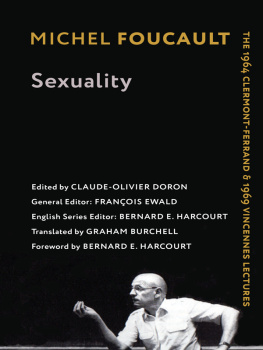
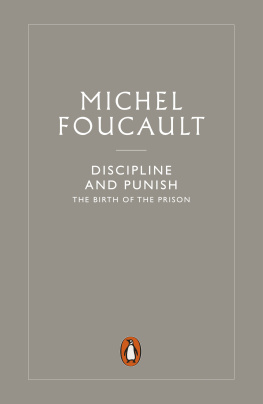
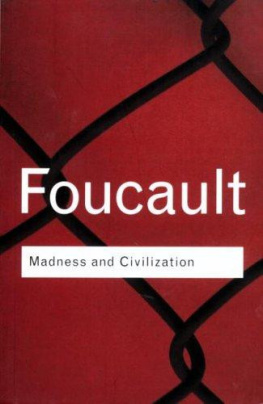
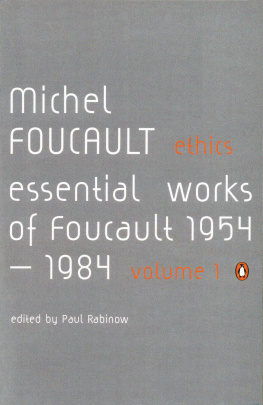
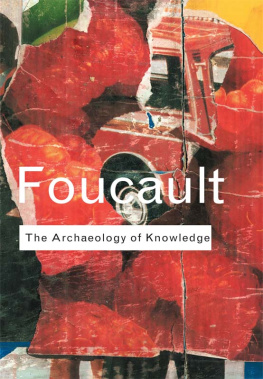
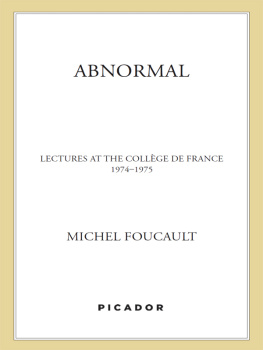
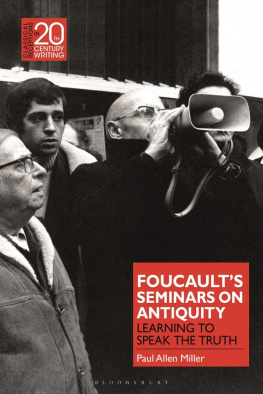
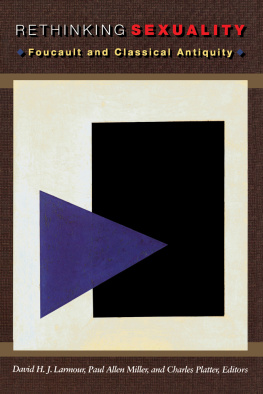
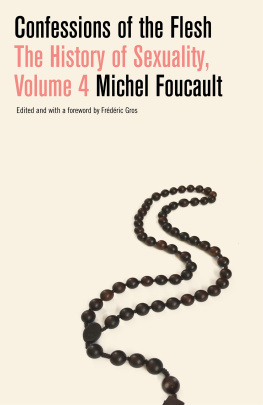
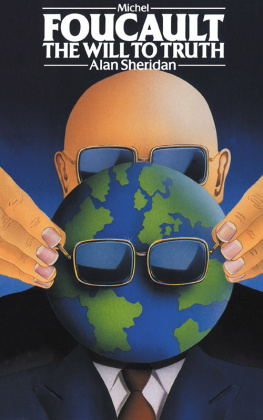
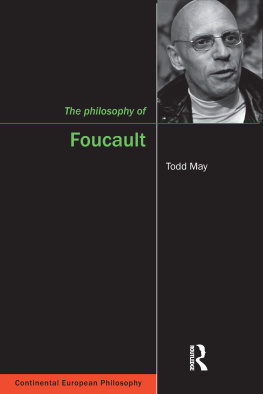
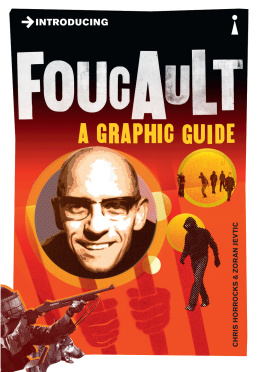

 This paper meets the requirements of ANSI/NISO Z39.481992 (Permanence of Paper).
This paper meets the requirements of ANSI/NISO Z39.481992 (Permanence of Paper).